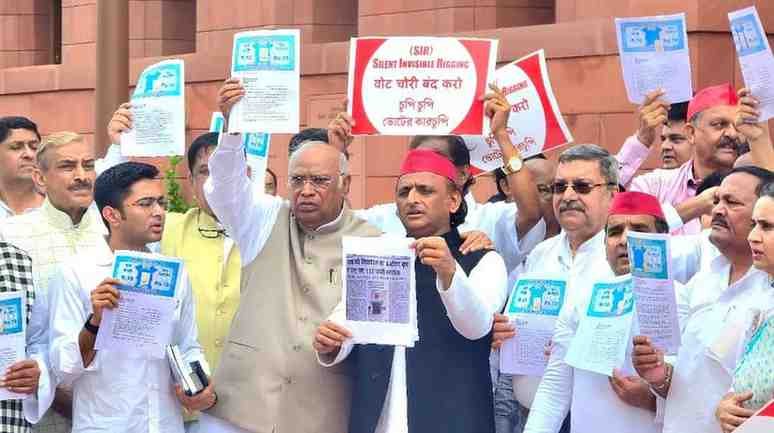New Delhi: A day after the Election Commission of India (ECI) conducted its first press briefing under Chief Election Commissioner (CEC) Gyanesh Kumar, opposition parties have strongly criticized the Commission for failing to provide clarity on several pressing issues, particularly concerning voter deletions and allegations of electoral fraud.
The Commission’s press conference, held on August 17, lasted for nearly 90 minutes and was widely anticipated as its first formal interaction with the media since the Supreme Court’s (SC) directive earlier this week.
However, opposition leaders allege that the briefing failed to address key questions and instead raised fresh concerns about the Commission’s neutrality and commitment to ensuring a free and fair electoral process.
Silence on Supreme Court’s Order
According to the opposition’s joint statement, the CEC avoided making any remarks on the Supreme Court’s order of August 14, which had rejected the Commission’s objections to disclosing voter data in Bihar.
The apex court had directed the ECI to release the details of approximately 65 lakh voters who were deleted from the electoral rolls, along with specific reasons for their removal.
Opposition parties noted that despite the clarity of the court’s directive, the Commission chose not to provide any update during the press interaction.
“The CEC gave no clarification or comment on the SC’s order, nor did he specify when or how the data would be published,” the statement read.
Bihar Survey Under Scrutiny
The opposition also raised questions about the State Intensive Revision (SIR) exercise being carried out in Bihar. They alleged that the process was being conducted in a rushed, poorly prepared, and ad-hoc manner, with little transparency.
The Commission, they claimed, failed to explain why the revision exercise was handled in such a fashion, leaving serious doubts about its credibility.
Voter Fraud Allegations in Karnataka
Another point of contention was the lack of clarity regarding allegations of voter fraud in Mahadevapura, Karnataka — an issue recently flagged by Leader of Opposition Rahul Gandhi. Gandhi had accused the ruling party of large-scale manipulation of voter lists and urged the Commission to launch an inquiry.
However, opposition leaders argue that the CEC merely repeated his demand that such claims be supported through affidavits, without committing to any form of investigation.
“The Commission refused to answer hard questions on why no inquiry had been ordered into serious allegations of voter fraud,” the statement asserted.
Opposition Questions ECI’s Neutrality
The joint statement went on to accuse the Election Commission of “completely failing” in its constitutional responsibility to ensure a fair electoral system.
Opposition parties claim that the Commission’s handling of recent controversies shows a tendency to sidestep meaningful scrutiny while shielding the ruling party from accountability.
“The ECI is not being led by officers who can ensure a level playing field. Instead, those at the helm divert attention from allegations of fraud and intimidate those who question the ruling party,” the opposition alleged, calling the situation a “serious indictment” of the institution’s independence.
Growing Concerns Over Electoral Integrity
The opposition’s sharp remarks come at a time when debates over electoral reforms and voter data security have intensified.
With key state elections approaching and general elections looming in 2026, concerns over voter deletions, discrepancies in electoral rolls, and the role of independent institutions have become central to political discourse.
Observers say that the Commission’s credibility is under growing strain, especially after the Supreme Court’s intervention in the Bihar voter deletion case. Analysts also note that the opposition’s united criticism signals a coordinated effort to highlight transparency issues ahead of polls.
What Lies Ahead
The Election Commission has yet to respond to the opposition’s statement. Whether it will comply promptly with the Supreme Court’s directive on releasing voter deletion data remains to be seen.
Meanwhile, opposition parties are expected to increase pressure on the Commission in the coming weeks, both in Parliament and on the ground. They are likely to push for independent inquiries into allegations of voter fraud and greater accountability in electoral revisions.
As the debate intensifies, the credibility of India’s electoral system — long regarded as a pillar of its democratic framework — appears to be at the heart of the political battle.








